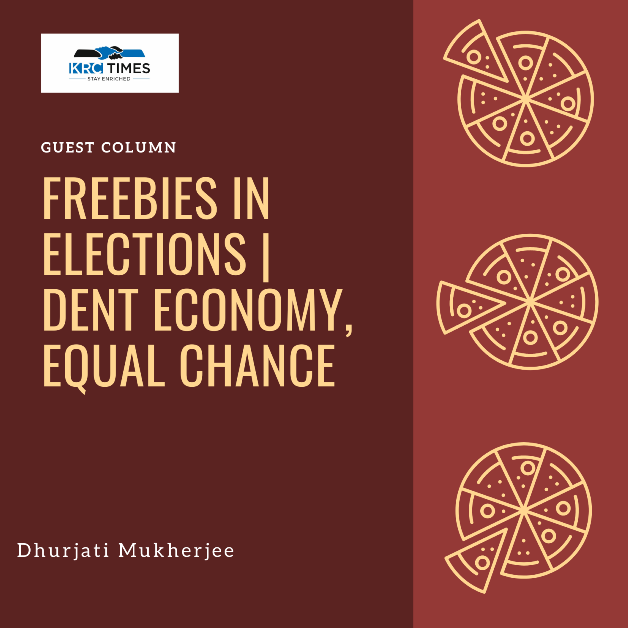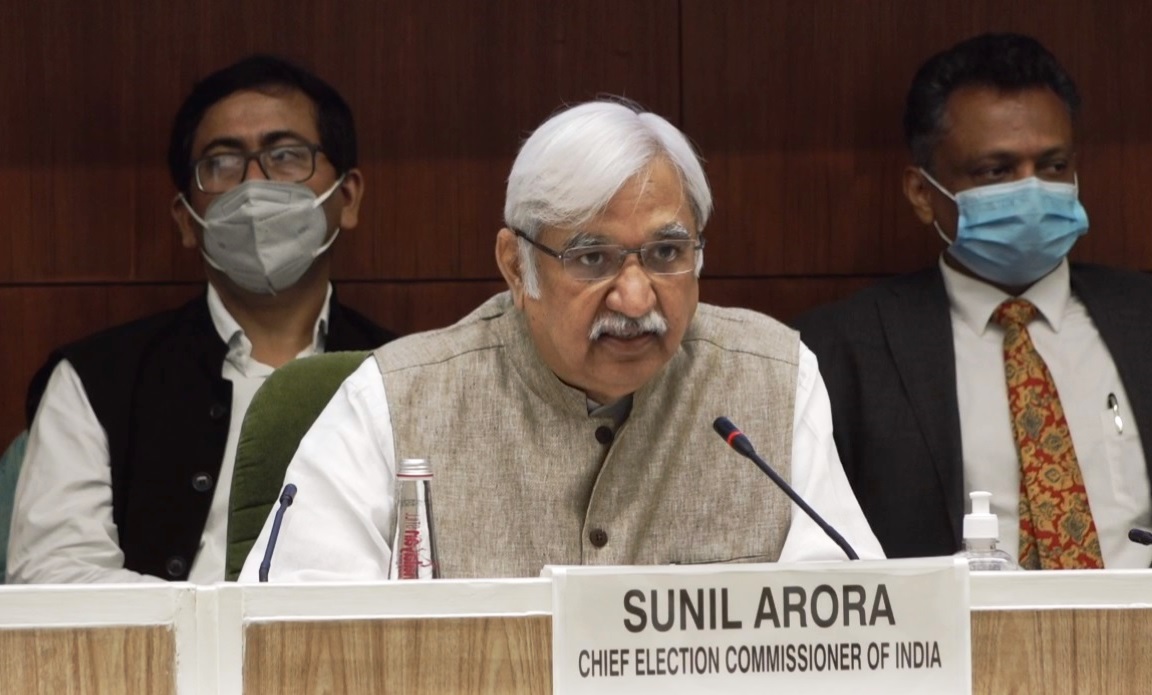But this situation cannot continue for long, as a result of which freebies before elections are grossly unjustified. Sensing the problem, top bureaucrats warned against the deleterious effects of announcements of freebies by various State governments, mostly before elections
 Dhurjati Mukherjee I INFA Service
Dhurjati Mukherjee I INFA Service

Freebies have for quite some years been playing a prominent role in electoral politics in India. Despite knowing the fact that freebies will put an additional burden on the exchequer, political parties have been competing with each other in the run-up to elections, announcing a string of freebies to attract voters. Interestingly, Prime Minister Narendra Modi recently cautioned people against what he called a ‘revadi culture’ of offering freebies for garnering votes and called it ‘very dangerous’ for the nation’s development. Dealing with the issue, the Supreme Court of India recommended that stakeholders set up a mechanism for suggesting measures to the government.
In recent years, the spotlight is back on how “irrational freebies”, often doled out ahead of polls, can be reined in. It may be mentioned here that the 15th Finance Commission suggested the establishment of a neutral body in the form of the Fiscal Council to look at the records of both the Centre and the States, although it was proposed to have only an advisory role. Power is possibly the most grotesque example of freebies, of flawed welfare economics neither guaranteeing welfare.
Many States are pursuing the freebie culture. Ideally, governments should use borrowed money to invest in both physical and social infrastructure which will generate higher growth, and thereby higher revenues in the future so that the debt pays for itself. On the other hand, if governments spend the loan money on populist giveaways that generate no additional revenue, the growing debt burden will eventually implode and end in tears. Concerned by an increasing number of States that are embarking on this financially ruinous path, senior bureaucrats reportedly flagged the issue that ‘some States might go down Sri Lankan way’.
Dealing with a Public Interest Litigation (PIL) on the issue, the Supreme Court, suggested the constitution of an experts group with representatives from Niti Aayog, Finance Commission, Reserve Bank of India, and political parties study the impact of freebies on the tax payers and the economy as a whole and recommend measures to regulate it. It is significant to note that during the hearing, the apex court did not leave the matter entirely to Parliament but referred to the inaction of the Election Commission, which, it felt, was relying on the 2013 judgment that stated that Nirvachan Sadan can only formulate a model code of conduct at the time of elections.
The PIL, which was filed ahead of the recent Assembly elections in five States, had sought a complete ban on populist measures to gain undue political favour from voters as these violate the Constitution, and the Election Commission should take suitable deterrent measures. The plea wanted the court to declare that the promise of freebies from public funds before polls unduly influences the voters, disturbs the level playing field, and vitiates the purity of the poll process. “This unethical practice is just like giving bribes to the electorate at the cost of the exchequer to stay in power and must be avoided to preserve democratic principles and practices,” it read.
Delving into the problem, one may perhaps find that the culture of freebies was started by the late Tamil Nadu Chief Minister, J. Jayalalitha, promising free saris, pressure cookers, washing machines, television sets, etc, and this was quickly followed by other political parties. In recent times, the AAP swept the Delhi Assembly elections by promising free electricity, and water to the voters. Lately, during the 2021 Kerala Assembly elections, freebies such as subsidised rice and food kits were promised by the ruling Left Democratic Front.
Before the Punjab Assembly elections, the AAP promised free electricity for 300 units to the electorate and Rs 1000 per month for every woman, aged 18 years and above, if voted to power. It did have a positive effect on the party. However, this speaks volumes about the impact freebies have. And while, as is exemplified in the case of Punjab, such a freebies culture can not only spell doom for the economy but is dangerous in case of a sensitive border State, AAP supremo Kejriwal, justifies it by saying that ‘giving away crores of rupees from the government exchequer to friends will lead to an economic crisis, and not providing free facilities to people.’
A recent State Bank of India Research report observed that unsustainable farm loan waivers might be a potential recipe for fiscal disaster. States including Rajasthan, Chhattisgarh, Andhra Pradesh, Bihar, Jharkhand, and Bengal have committed to spend 5 to 19 percent of their revenue receipts on unsustainable schemes. In terms of percentage of State owned tax revenue, this exceeds 50 percent for some of the States.
Obviously, there is a need to rationalise their spending priorities, though some of the welfare schemes, if they reach the target beneficiaries may have a positive effect. The SBI report of Dr. Soumya Kanti Ghosh noted that for as many as 18 States it studied, the average fiscal deficit (as a percentage of GSDP) has been revised upwards by 50 bps to 4 percent for the financial year 2022 with 6 States slithering towards the red line, reporting fiscal deficit more than 4 percent of GSDP.
It is a well-known fact that the financial condition of many a State is indeed precarious. In the last fiscal, as many as seven States exceeded their budgeted target while 11 others have been able to keep their fiscal deficit equal to or lower than their budgeted numbers. It may be noted that the Comptroller and Auditor General of India (CAG) pointed out that in respect of some States “if extra-budgetary borrowings are taken into account, the government’s liabilities are way above what is acknowledged in the official books”.
But this situation cannot continue for long, as a result of which freebies before elections are grossly unjustified. Sensing the problem, top bureaucrats warned against the deleterious effects of announcements of freebies by various State governments, mostly before elections. They wanted the Election Commission to stop the unsustainable freebies in the greater interest of the economic health of the States.
A question may arise that these freebies are mostly extended to people living in rural and backward areas and thus benefit the poor and the economically weaker sections (EWS). This argument is not quite justified as irrational freebies eat away the development budget of the indebted States that do not have sufficient funds for welfare schemes as also for undertaking development work in rural and backward areas. It is thus quite obvious that the more States spend on freebies, the less they have for spending on physical infrastructures such as power and roads, and on social infrastructure such as education and health, which can potentially improve growth and generate jobs.
The present step by the apex court should have come much earlier, as the recommendations of the expert committee may help regulate freebies. Moreover, the political parties should not be allowed to announce freebies before elections at their will without the prior consent of the Election Commission as also getting such decisions passed in their respective State Assemblies. Development and a level playing field should not become victim to freebies.—INFA
Advertisements | 5E For Success

KRC Career Membership Program is the first step toward an evolved career-building support system powered by KRC Foundation. Ideal for students and job seekers. Mail resume to- 5eforsuccess@gmail.com





